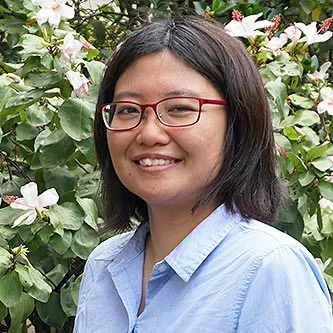From one tropical island to another
Originally from sunny and humid Singapore, Professor Neo completed her doctoral degree in Communication at the Ohio State University before starting her tenure track position within the Communication Program at the University of Hawaiʻi at Mānoa.
Of Social Media and Politics
One aspect of Professor Neo’s research program focuses on examining how features of online content influence political judgments. Notably, a sole-authored journal article of hers challenged oft-held notions about the ways in which online features work. For example, it has been assumed that people will blithely rely on star ratings to guide their judgments of online content. However, she demonstrated that people will first assess star rating scores for compatibility with their own political beliefs, and will reject ratings that disaffirm their political beliefs. Under such circumstances, favorable star ratings will ironically cause message distrust and vice versa. Such work has important practical applications—in terms of promoting acceptance of issue facts on politically contentious issues—it may actually be better to omit online rating scores for content about which people have strong prior beliefs.
Furthermore, she seeks to further examine how online content features exacerbate animosity between Republicans and Democrats in America’s highly fragmented political landscape. She recently obtained extramural funding to examine how Reddit political discussion threads influence perceptions regarding the prevalence of, and social acceptability of, hostile emotions toward out-party entities, and whether such perceived norms regarding hostility toward political opponents cause partisans themselves to embrace uncivil attitudes toward the out-party.
Of Media Use and Local Issues in Hawaiʻi
Another aspect of Professor Neo’s research centers on examining how media use patterns impact socially vulnerable groups in Hawaiʻi and attitudes toward local issues. For example, in a co-authored study on Facebook use among sheltered homeless individuals on Oʻahu, she and her collaborators showed that homeless Facebook users were more likely than non-users to use the Internet to search for jobs, have their own cellphones, access the Internet from their cellphones, and be heavier cellphone users than Facebook non-users. These findings suggest that: 1) Hawaiʻi’s policy makers should devise ways to make personal cellphone ownership more attainable for homeless individuals to help them maintain social support with close friends and loved ones via Facebook, and 2) homeless shelters in Hawaiʻi can train homeless Facebook users to translate knowledge acquired from online job searches into offline success in finding jobs.
Amid growing concerns about environmental damage due to over tourism, Hawaiʻi state authorities’ have expressed the importance of developing new approaches to current sectors by convincing tourists to partake in sustainable and regenerative tourism activities. However, tourists obviously do not form attitudes about travel activities in a vacuum but rather rely on information sources to guide their decisions. With this in mind, she further intends to examine how media consumption, social networks, and demographic characteristics influence tourists’ intentions to participate in sustainability and regenerative tourism initiatives when visiting Hawaiʻi. The findings from such research could potentially help state authorities plan and design effective campaigns to persuade tourists visiting Hawaiʻi to participate in such alternative, environmentally friendly tourist activities.
